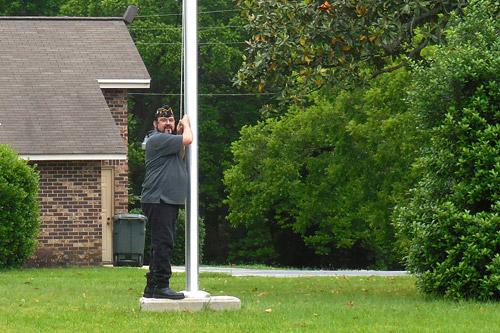
Ask veteran Joseph Carmine why he and fellow veterans install flag poles outside churches and schools in Drew County and he’ll cut right to the point.
“To me the most important symbol is the cross. The second most important symbol is the American flag,” Carmine, 55, said.
A member of St. Mark Church in Monticello, Carmine said he and about 12 fellow members from the American Legion, Veterans of Foreign Wars and Disabled American Veterans have installed five flag poles since 2010, one of the many ways the organizations honor veterans. The flags and poles are donated by Woodmen of the World, costing as much as $1,500 for American flags, an Arkansas flag and a pole.
At St. Mark, the flag was blessed and a solar light was donated by the church so the flag can remain raised all the time.
“The stars and stripes, they mean a lot to me and the more you see it, the better I feel. There’s a lot of us that feel that way,” Carmine said of his fellow veterans.
It’s a way to honor God and country, something Carmine has done all his life.
Growing up in upstate New York, his Italian heritage made him a target for racism as a child.
“My grandfather got tomatoes and eggs thrown at him. As a kid, they called me black turned inside out,” Carmine said, adding that he was Italian, Irish and English, so “I was kind of caught in the middle,” of the ethnic groups.
Following in the footsteps of his father and brother, Carmine joined the U.S. Navy in March 1979 as a way to have steady work. For the next 14 years, he traveled to various overseas locations, including the Mediterranean, Suez Canal and Persian Gulf. He was stationed aboard the USS Mullinnix DD-944 during the Iran hostage crisis, moving from the Mediterranean where he was stationed for three months to off the coast of Iran for six months. The ship served as naval gunfire support.
“We went over there and it wasn’t fun. After 90 days … we had three beers issued to us. It was a moral thing,” he said.
In 1993, he was a civilian mariner on Navy ships for eight years and joined the U.S. Navy again in 2002. In 2003, he spent six months in Bahrain as base security. In the mid-2000s, Carmine enlisted in the Army National Guard.
“We were at war still. I felt obligated, I was only 46 years, I figured I still had a couple more years,” he said.
In 2008, he was deployed to Iraq for 11 months. Carmine worked 12-hour nights guarding the towers at Camp Taji, which included getting meals for men in the towers keeping watch and making sure they stayed awake.
“We did have an IED go off at the muffler shop, about three football fields away from our hooch,” military slang for where they stayed, Carmine said. “I think I hit my head on the bunk above me when it went off.
“I prayed every day because you are in harm’s way. They threw RPGs (rocket-propelled grenades) at us, daily they shot at us,” Carmine said. “I slept with my weapon with me, an M-4.”
Though he could not go to Mass, Carmine leaned on God during the tough times, including being far from his wife Maryann and his son Raymond, now 13.
“I did Our Fathers, Hail Marys, Glory Bes, the rosary when I could get that in,” Carmine said, adding that Psalm 23:4 spoke the most to him. “‘Although I’m in the belly of darkness I will fear no evil’ (paraphrased). Basically I remember that the most because that’s basically what Iraq was at the time. They used to have artillery … explosions going on all day long and all night long.”
Though he has faced struggles adapting to civilian life after retiring in 2011, his faith helps him handle the stress, he said. His work helping to install flag poles is spiritual — doing his part to make sure no one forgets the sacrifices of those who served.
“I sit there and think about people that have it worse than I do,” Carmine said. “I’m still here and still trying, with God’s help. I’m glad I’m here and praying to God and thanking him for everything he gives.”
Please read our Comments Policy before posting.
Article comments powered by Disqus St. Mark Church remembers prisoners’ children at Christmas
St. Mark Church remembers prisoners’ children at Christmas
 Christmas Eve and Christmas Mass Schedule 2022
Christmas Eve and Christmas Mass Schedule 2022
 Cremation, inurnment continue to grow in Catholic churches
Cremation, inurnment continue to grow in Catholic churches
 Divine Mercy devotions to conclude April 24 with holy hour
Divine Mercy devotions to conclude April 24 with holy hour
 Monticello teens teach ‘Dos and Donuts’ of technology
Monticello teens teach ‘Dos and Donuts’ of technology
 Winning directory photo honors Our Lady of Guadalupe
Winning directory photo honors Our Lady of Guadalupe
 St. Paul says: How does the Bible define love?
St. Paul says: How does the Bible define love?
 6 steps to getting married in Diocese of Little Rock
6 steps to getting married in Diocese of Little Rock
 Most frequently asked questions on Catholic marriage
Most frequently asked questions on Catholic marriage
 St. Joseph a model of solidarity with immigrants
St. Joseph a model of solidarity with immigrants
 Two gifts after Jesus’ death: Virgin Mary and Eucharist
Two gifts after Jesus’ death: Virgin Mary and Eucharist
 Why we have an altar, and not just a communion table
Why we have an altar, and not just a communion table
 Pope: Wars should be resolved through nonviolence
Pope: Wars should be resolved through nonviolence
 Living relationship with Jesus Christ in the Eucharist
Living relationship with Jesus Christ in the Eucharist